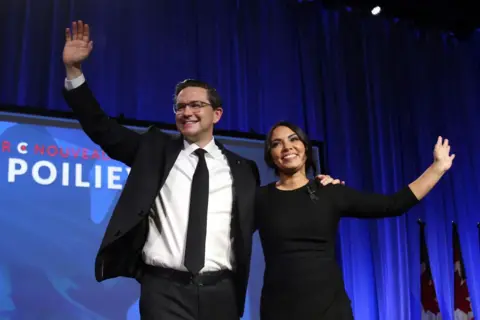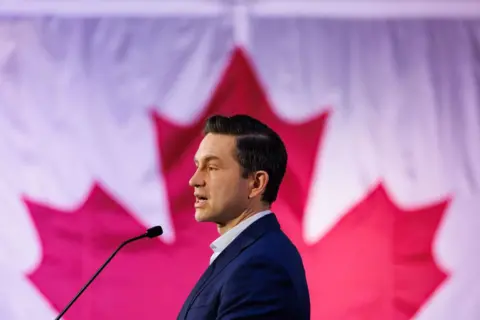
When Pierre Poilievre was 20, he already had a road map for Canada.
Canada's Conservative Party leader – now 45 – has put forward a low-tax, small-government vision for the country in an essay competition about what he would do as prime minister.
He said: “The dollar that remains in the hands of consumers and investors is more productive than the dollar spent by politicians.”
Poilievre is one step closer to making his vision a reality, and even gave a nod to the article in a recent interview with conservative psychologist and commentator Jordan Peterson.
For months, Poilievre's Conservatives have enjoyed a significant lead over the struggling Liberals in national opinion polls, suggesting they would win a majority government if elections were held today.
Now Prime Minister Justin Trudeau has announced his resignation, and with an election likely to be called soon, Poilievre is promising a return to “common sense politics.”
For Canadians frustrated by the slowing economy and the housing and affordability crisis, he offers an alternative to what he described as Trudeau's “authoritarian socialism.”
A win would make him part of a wave of populist leaders on the right who have toppled established governments in the West.
Although it has invited comparisons with Donald Trump – who has admirers like Elon Musk and others in the US president-elect's orbit – Poilievre's story is very much a Canadian one.
Calgary has its eyes fixed on Ottawa
Poilievre was born in the western Canadian province of Alberta to a 16-year-old mother who put him up for adoption. He was taken in by two school teachers and raised in the Calgary suburbs.
“I've always believed that voluntary generosity between family and community is the greatest social safety net we can ever have,” he told Maclean's magazine in 2022, reflecting on his early life.
“This is kind of the starting point.”
As a teenager, Poilievre showed an early interest in politics, canvassing local conservative votes.
Poilievre was studying international relations at the University of Calgary when he met Stockwell Day, who served as a minister in former Conservative Prime Minister Stephen Harper's government.
At the time, Day was seeking to lead the Canadian Alliance — a right-wing party with Alberta roots that became part of the modern Conservative Party in a 2003 merger — and he tapped Poilievre to help with campus outreach.
“He impressed me from the beginning,” Day said in an interview with the BBC. “He seems to be a level-headed man, but full of energy and able to attract people's attention.”
Day's attempt at leadership was successful, and he set off for Ottawa with Poilievre as his assistant. Some time later, Poilievre walked into his office on a cold winter's night to ask him what he thought about the possibility of running for president.
Poilievre went on to win a seat in Ottawa in 2004 at the age of 25, making him one of the youngest Conservatives elected at the time. He has held that seat ever since.
 Getty Images
Getty ImagesFrom “skippy” to party leader
In Ottawa, Poilievre was nicknamed Skippy by peers and enemies alike because of his youthful enthusiasm and sharp tongue.
He built a reputation for being “very combative and partisan,” said Randy Biscoe, an assistant professor of political science at the University of Toronto.
Day said that behind the closed doors of Conservative Party meetings, Poilievre showed his diplomatic side.
“Pierre was always good at saying, ‘Well, you know what?’” Day said. “I didn’t think about that,” or he would listen and say, “Have you thought about that?”
However, confrontational politics became a cornerstone of Poilievre's public persona. After becoming Conservative leader in 2022, he has been targeting Trudeau with scathing statements as a way to reach out to disaffected voters.
It got him into trouble sometimes. In April, he was expelled from the House of Commons for calling the Prime Minister an “idiot”.
Poilievre told the Montreal Gazette in June that he is a fan of “straight talk.”
“I believe that when literature conflicts with the truth, I choose the truth,” he said. “I think we've been too polite for too long with our political class.”
His combative style has also been divisive, and he has been criticized for oversimplifying complex issues for political gain.
While Canadians were open to the opposition leader's message as a change from Trudeau's progressive politics, just over half of them had a negative opinion of him. According to the latest opinion polls.
Poilievre has also been forced to change his sights since Trudeau's resignation was announced, to move forward in the inevitable confrontation between him and the next Liberal leader.
Poilievre on populism, immigration, and Trump
The Conservative leader has been described as a “soft” populist due to his direct appeals to ordinary Canadians and his criticism of establishment elites, including Canadian corporations.
He came out in support of those protesting vaccine mandates during the 2021 “Freedom Caravan” demonstrations that shut down Ottawa for weeks.
He has pledged to implement “the largest crackdown on crime in Canadian history” and has promised to keep repeat offenders behind bars.
On social matters, Poilievre rarely had his say, something Professor Pesco said was typical of senior conservatives, who view these topics as a “lost cause.”
While Poilievre voted against legalizing same-sex marriage in the early 2000s, he recently said it would remain legal “a full stop” if elected.
Conservatives also do not support legislation regulating abortion, although they allow MPs to vote freely on the issue.
“I will lead a small government that minds its own business,” Poilievre said in June.
Middle A Public debate in Canada in recent months On immigration, the party said it would link levels of new arrivals to the number of new homes built, and would focus on bringing in skilled workers.
Poilievre's wife, Anaida, arrived in Canada as a child refugee from Caracas, Venezuela.
The Conservative leader has urged integration of newcomers, saying Canada does not need to be a “close-knit society.”
One of his key promises — to cut Trudeau's national carbon pricing program, arguing that it represents a financial burden on households — has raised questions about how his government will address pressing issues like climate change.
 Getty Images
Getty ImagesCanada also faces the threat of steep tariffs when Trump takes office later this month, and the relationship between the United States and Canada is expected to pose a major challenge.
He pushed Poilievre back Trump's comments suggest Canada becomes No. 51 A US state pledges to “put Canada first.”
He did not intervene much in foreign policy, with his messages focusing instead on restoring the “Canadian Dream.”
Above all, Poilievre says he wants to do away with the “grandiosity” and “utopian consciousness” that he believes have defined the Trudeau era, in favor of “great, great things about the common people.”
“I've been saying the exact same thing all this time,” he told Mr. Peterson.








